(Original title: Li Kaifu’s graduation ceremony at Columbia University: Love makes humans different from artificial intelligence)
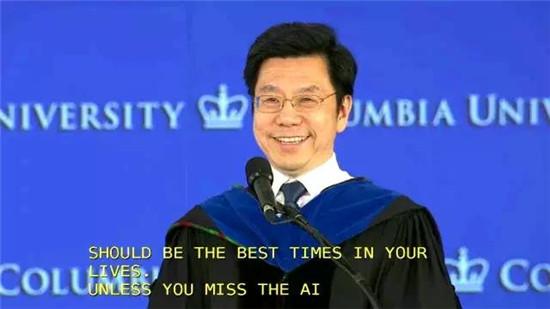
On May 15th, Dr. Li Kaifu, founder and CEO of Innovation Factory, Dean of the Artificial Intelligence Engineering Institute, served as a special guest. He graduated from the School of Engineering, Columbia University in New York, to the 2017 graduates with the title of “An Artificial Intelligence Galactic Roaming Guide for Engineersâ€. Speech.
As a 83rd graduate student of Columbia University, he benefited from the young, lively, cutting-edge, free style of study of this university. In his speech, he recalled the growth and beauty that Columbia brought him, and fervently hoped that future engineers would embrace it. The arrival of artificial intelligence, aligning career choices with artificial intelligence tracks; shouldering the mission of engineers, following their own hearts, allowing the next 10 years to become the most brilliant 10 years in life.
The graduation ceremony of Columbia University in New York dates back 258 years. The most representative outdoor graduation ceremony at Morningside began in 1926. According to tradition, principals of Columbia University are usually speakers of graduation ceremonies for the whole school. The graduation speakers of each college are determined by the college itself, and the college will usually leave this opportunity of great honor to outstanding alumni.
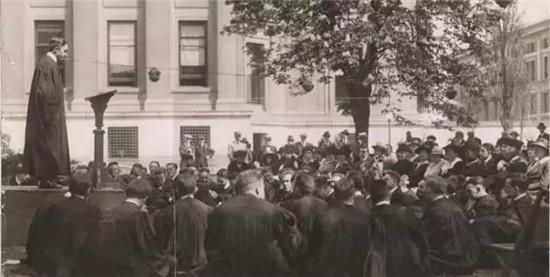
Former U.S. President Barack Obama, former U.S. Secretary of State Hillary Clinton, former U.S. Ambassador to Japan Caroline Kennedy, former Mayor of New York City Michael Bloomberg, Facebook COO Shirley Sandberg, Germany David Shawd, the founder of One Foundation (one of the world's largest hedge funds), has served as a special guest speaker at the graduation ceremony of Columbia University.
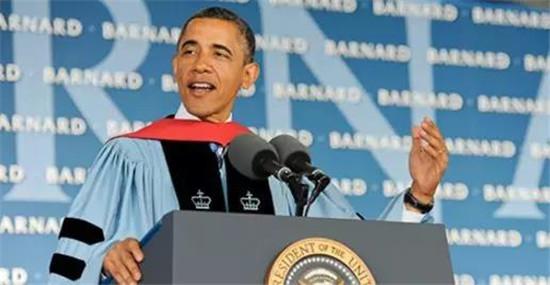
Mary C. Boyce, Dean of Columbia University of Engineering, said:
Dr. Li Kaifu is a global representative of Columbia University of Engineering. His guidance to young entrepreneurs reflects the leadership and feedback spirit we have always advocated to students. As a young mentor and a successful investor in both China and the United States, Dr. Li Kaifu is the perfect choice for graduation ceremony speakers.
The following is an excerpt from the speech of Dr. Li Kaifu’s graduation ceremony at Columbia University’s School of Engineering in New York (English-Chinese bilingual edition)
Lecture title: "Engineer's Artificial Intelligence Galaxy Tour Guide"
The 2017 graduates thank you for inviting me to participate in such a grand graduation ceremony. It is my great honor to return to my alma mater, Columbia University, to give a speech on this important occasion of a group of such outstanding graduates, parents, brothers and sisters, and all the guests gathered to share the joy of this graduation event.
First of all, I want to say to all the graduates: I am very proud of you, and I congratulate you on your academic success. Your family members are also proud of you. Today all the cheers and applause belong to you!
Thirty-four years ago, I sat in your current seat. It was the best time in my life. In the university era, I found the field of expertise that I had pursued throughout my life—artificial intelligence, and found the biggest hobby in my life—the bridge. At that time I played bridges for 30 hours a week, but until now, Columbia did not give me a bridge degree. At Columbia, I also found my first love. Fortunately, she later became my lifelong love. At that time, at my graduation ceremony, I had the honor to hear the speech of science fiction master Isaac Asimov. I am very sorry that you can only listen to me today.
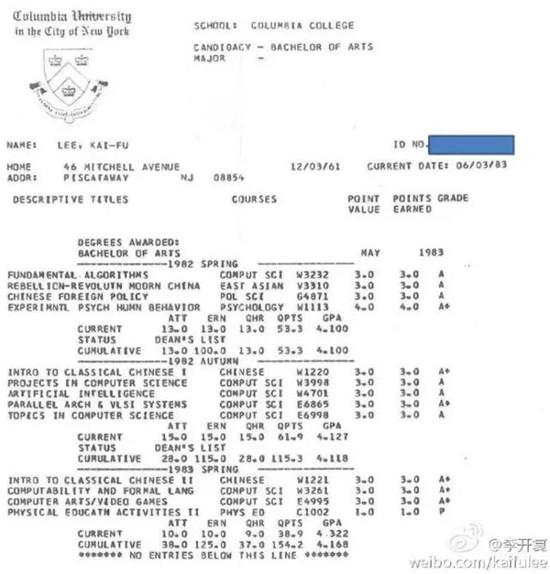 Dr. Li Kaifu’s transcript at Columbia University
Dr. Li Kaifu’s transcript at Columbia University
In any case, I spent the best time in life at Columbia University. You may think that I or other graduating speakers will say "These years are also the best time in your life" and I do not intend to say so.
I know these years are far from the peak of your life, because the most exciting days have not yet arrived. Instead of looking at the present, it is better to look to the future: I believe that the next 10 years will be your best life.
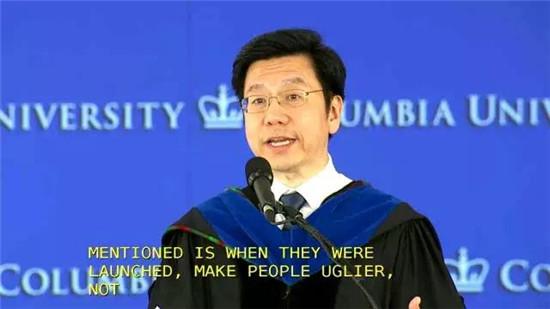
Why is it 10 years? 10 years may sound far-distant, but this is not the case. If we look back at the situation in May 2007 together, you will suddenly find that in the past 10 years, our world has undergone tremendous changes.
Everyone must remember that in 2007, Steve Jobs released the iPhone? At that time, I was still using my BlackBerry and my wife still used her Nokia.
Also in 2007, the young Senator Barack Obama decided to run for the presidency of the United States. At that time, Donald Trump often called out "You were fired" instead of "Let the United States be great again."
So, 10 years is enough to make a major change in human life. I think that in the next 10 years, we will be more staggering than the past 10 years. This is because the next 10 years are the era of artificial intelligence and the era of AI.
As an engineering student, you should find that the number of elective courses in artificial intelligence courses jumped from 80 to 800. This indicator clearly tells us that artificial intelligence is booming.
In 1980, I first learned about artificial intelligence at Columbia University. For 37 years, I have been engaged in research, development, and investment-related work in the field of artificial intelligence. I can predict with relative confidence that the artificial intelligence revolution of the future will be on par with the Industrial Revolution in terms of scale, and may even bring about far faster and more dramatic changes than the Industrial Revolution.
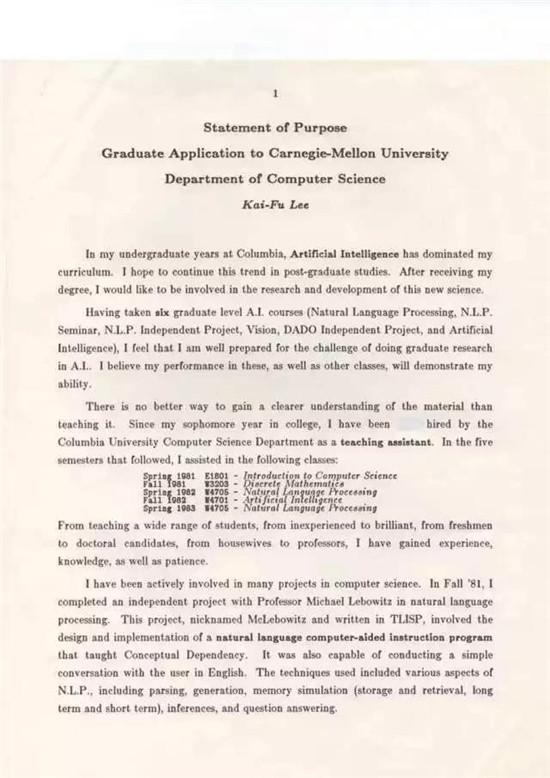
 When Dr. Li Kaifu applied for a doctoral dissertation, he wrote in his letter to the professor: Artificial intelligence is the interpretation of the human learning process, the quantification of the human thinking process, the clarification of human behavior, and the understanding of human intelligence.
When Dr. Li Kaifu applied for a doctoral dissertation, he wrote in his letter to the professor: Artificial intelligence is the interpretation of the human learning process, the quantification of the human thinking process, the clarification of human behavior, and the understanding of human intelligence.
What I am talking about is not Futurist's unrealistic prediction of artificial intelligence. It is a dialogue between engineers and engineers. As an engineer, we understand how artificial intelligence works. With the increase in data and usage, how artificial intelligence can progress iteratively, we also know how to reasonably estimate the impact of artificial intelligence in the next 10 years.
First, let's take a look at what AI can do today.
Today, I invest in an artificial intelligence image processing company that can use their product technology to make everyone's selfies more beautiful. The company’s products have become a popular trend, and every Chinese movie star I know will never allow my photos to be easily released without beautifying the product. How large is the user base of this product? 1.3 billion!
Today, an artificial intelligence credit company I invested in China was able to complete each loan approval in a matter of seconds. The bad debt rate was much lower than a traditional cumbersome loan application that a credit officer would need to review for several days. This company was established less than 2 years ago, this year it is estimated that it will be able to issue about 30 million loans, almost more than any traditional bank I know.
Today, I invested in an artificial intelligence face recognition company. Their products can identify any face in 3 million faces and their accuracy is far beyond humans. If this software is installed at airports around the world, it will basically prevent known terrorists or wanted criminals from boarding any civil airliner.
The current total valuation of the above three artificial intelligence companies is close to 10 billion US dollars. This value can only be regarded as a fraction of a small amount compared with the huge value of the industry that artificial intelligence will create in the next 10 years.

In the next 10 years, all financial companies will undergo dramatic changes because artificial intelligence will replace traders, bank employees, accountants, analysts, and insurance brokers. Last year, I tried to use the smart investment algorithm to get eight times more money than my personal financial advisor - which reminded me that after returning home, I could dismiss this private financial advisor.
In the next 10 years, artificial intelligence will replace most factory workers, assistants, consultants, and intermediaries. But artificial intelligence is not limited to simple work. Artificial intelligence will also replace some journalists, doctors, and teachers. Your AI will know better than you what you want to eat tonight, where you should go on holiday, and who you want to date.
And more, after 10 years, robotized artificial intelligence will become stable and reliable. The use of artificial intelligence in automatic driving will be safer than human driving. Today's relatively basic home Roomba sweeping robot will make us stand out in the future: the robot will learn to cook, wash clothes, do cleaning, and help humans share all the heavy housework.
After 10 years, we will enter an era of abundant fertility, because artificial intelligence can create tremendous value for human beings and help us eliminate poverty and hunger. Each of us will also gain more time and freedom to do what we love to do.
After 10 years, we will also enter an era of anxiety and confusion. Artificial intelligence will replace half of human work. Many people will become depressed because they are unemployed and cannot achieve self-fulfillment. By then, many of you will become parents and will certainly consider how to educate your children in order to avoid being replaced by artificial intelligence.
The above prediction is not based on a simple comparison between the number of human neurons and the number of neurons in the machine simulation. Instead, my prediction is an inference by an engineer based on existing algorithms, market supply and demand conditions, and labor information.
At Innovation Workshop, we have raised more than one billion U.S. dollars in funds to invest in artificial intelligence, and Softbank Japan has launched a 100 billion U.S. dollar vision fund. IBM, Microsoft, and modern tech giants such as Google and Facebook, which have been developing for more than 40 or 50 years, have all announced that they are artificial intelligence companies. Even if you doubt my prediction, you probably don't doubt these tech giants.
So, for those of you who are standing at the forefront of science and technology and are extremely clever, 2027 will be the highest peak of your life. In case you accidentally miss this artificial intelligence revolution, the next 10 years may fall into the trough of your life's lowest.
So, how can we not miss the era of artificial intelligence and ensure that you are at the top of your life? I propose three suggestions:
My first suggestion: Embrace the coming artificial intelligence
To align your career choices with artificial intelligence tracks and face all major changes and opportunities, you first need an open mind to welcome artificial intelligence. It is absolutely normal to fear change. As Mark Twain puts it, "Courage comes from fighting fear and defeating fear, not from fearlessness."
Your past efforts can help you calmly embrace, embrace or enthusiastically embrace future changes - these changes will drive you to find a new life direction.
In the future, you must choose to embrace artificial intelligence. Even if the first artificial intelligence tool in your field seems to be so fragile, believe me, as long as there is more data, they will soon improve.
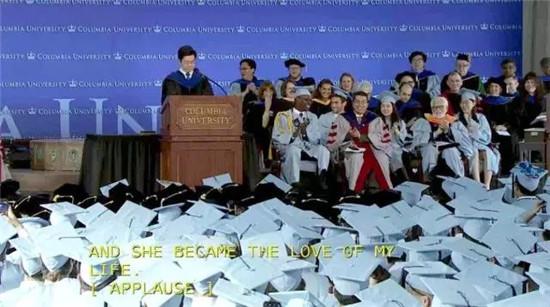
The three software companies that I mentioned just now have had their first-generation products in great condition. Self-timer and landscaping functions have turned many people's faces into ugliness. Inaccurate loans have also caused losses of several million yuan. Image recognition The face actually misjudged me as a talk show host. But in time, when artificial intelligence processes more and more data, the ability of artificial intelligence to self-learn will enable these products to surpass humans in specific areas. Artificial intelligence algorithms are not only simpler than humans. They are not tired, complain, and do not strike. Artificial intelligence also has infinite potential for scale.
Moreover, with the cost reduction of hardware, software, and network bandwidth, the cost of artificial intelligence is almost the cost of electricity.
So, no matter what job area you choose, you must first use artificial intelligence tools. If you are a software engineer, you can use artificial intelligence tools to examine and refine code, find reusable code, and even write code using AI. When building a team, use artificial intelligence tools to recruit and select talents. If you are ready to start your business, you can use artificial intelligence tools to manage orders and optimize profits. You can also use artificial intelligence tools instead of customer service and sales staff. You can use robots to make products and use automated vehicles to deliver goods.
The result of human and artificial intelligence collaboration is 1+1=3. For example, if a doctor diagnoses cancer correctly and can save 70 lives in 100 patients, an early artificial intelligence tool can save 60 lives in 100 patients. When doctors and artificial intelligence are combined, maybe they can increase their lives by saving 80 lives. Moreover, when artificial intelligence tools are optimized to save 80 lives, combining artificial intelligence with doctors may be able to save 90 lives.
Therefore, instead of passively accepting artificial intelligence, you should actively embrace artificial intelligence, explore the possibilities of artificial intelligence, and find all the possibilities for artificial intelligence to create value for you. You have to learn to use artificial intelligence to build faster and smarter collaborative relationships between humans and artificial intelligence. You will get huge benefits like the first reporter to use word processing software, or the first accountant to use spreadsheet software, or the first photographer to use Photoshop image processing software. In addition, compared with traditional software tools, artificial intelligence has evolved much faster and has a wider range of applications. Only as a leader in active embrace, you can only consolidate and grow in the leading position of artificial intelligence tools.
My second suggestion: shoulder the mission of the engineer.
As is known to all, for hundreds of thousands of years, doctors have followed the Hippocratic oath and have assumed the sacred mission of saving lives and wounds. In the age of artificial intelligence, I think that the mission of an engineer is equally sacred and even heavier.
why would you say so? Because in the age of artificial intelligence, as a top engineer who graduated from the top universities, you have great power. Please do not forget the famous philosopher of the world, Spiderman: "The greater the power, the greater the responsibility."
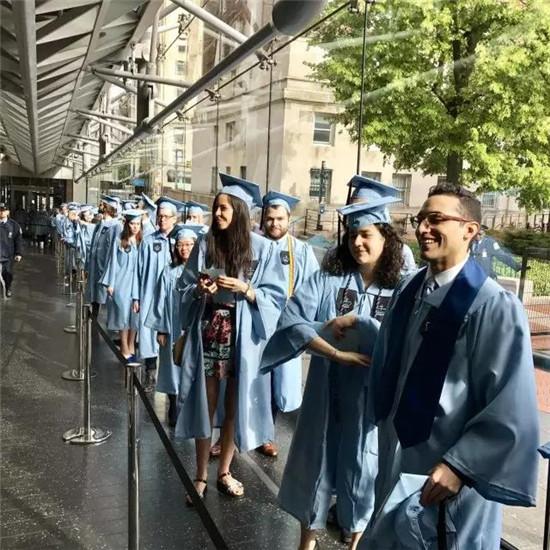
In the age of artificial intelligence, automatic or semi-automatic algorithms can be responsible for making investment decisions, caring for children, driving cars, and completing medical procedures. Future artificial intelligence products will directly affect people's property, health and even life, and you are the designer and manufacturer of these products.
As engineers, we cannot renounce our morality and responsibility. We need to be rigorous, diligent, and ethical in all aspects. This not only refers to the architecture and coding, but also includes designing, testing, training machine learning models, downloading updated parameters, and so on.
The first-generation airbags saved many lives, but at the same time, due to imperfect design and usage instructions, the child's petite shape was not fully taken into consideration and accidentally caused the death of some children.
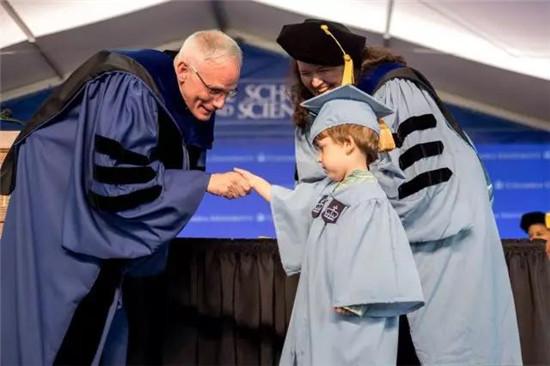
So your primary mission is to take responsibility for your users and ensure that your products are safe, thorough, and useful. It should be said that not only product safety, but also your absolute responsibility to anticipate and prevent potential technology out of control poses a threat to humans. So please say no to the "automatic killing machine" and "user privacy data transaction"!
Your second level mission is to be responsible for yourself. In the era of artificial intelligence, you are not only competing with other people, you are still competing with artificial intelligence. You have the responsibility to solve difficult problems first, instead of wasting your time on things that the machine can do. Do not choose a job that is not challenging for you. In any field, you must be willing to take risks and diligence in learning. Only in this way can you become the most unique and valuable human member. To insist on innovation and creativity – The strength of artificial intelligence lies in optimization, not innovation.
Your last mission is to be an engineer and use your choices to make this world a better place: choose to save lives instead of mutilating them; choose to inspire others instead of suppressing others; choose to work in sympathetic, non-greedy institutions; Choose an employer who wants world peace instead of trying to dominate the world.
My last suggestion: follow my heart
Having talked about so many serious technical topics, the next point I would like to make may sound somewhat inappropriate here, but it is my heartfelt statement.
Four years ago, I was diagnosed with the fourth phase of lymphoma. At that time I faced the ruthless fact that my life may be only a few months left.
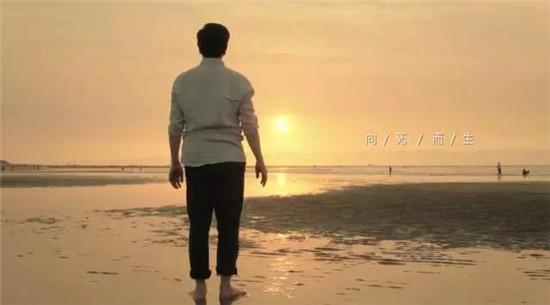
In the uncertain time before that period, I thought deeply about the meaning of life. I realized that all my achievements, including the era of artificial intelligence that finally arrived after more than 30 years of waiting, were actually meaningless to me. I realized that in the past I was pursuing science and technology, products, investment, and business, I placed a lot of emphasis on the priority of everything. I ignored my family. My father passed away. My mother had hardly known me. My children grew up unconsciously.
During treatment, I read a book by Bronnie Ware, which records the last regrets of the patient's lifetime. The author mentioned that no one will regret not doing enough work in the past, not working hard enough to work overtime, or lacking in property accumulation. What people most hope when they are on the end is that they hope to have a chance to spend more time with their loved ones.
Fortunately, my current condition has eased, so today I can only come to Columbia with you. Today, I will spend more time with my family. I moved my family to a place closer to my mother. I will travel with my wife as much as possible, whether on a business trip or simply traveling. When the children come home, I will take two or three weeks from the job instead of just two or three days to accompany them.

I also spend more time meeting new people. I spend my weekends with good friends. I lead company employees to spend a week in Silicon Valley. Silicon Valley is like a holy land for them. I meet community platforms. Young people who asked me questions, I contacted people I had offended many years ago and asked for their understanding. I wrote a book and filmed a documentary, sharing everything I learned from death.
This experience of facing death not only changed my life and values, but also made me more aware of the true meaning of artificial intelligence for human beings.
Elon Musk and Stephen Hawking have already given their point of view. They believe that machines will replace humans in their entirety, and humans can only have the option of either controlling AI or becoming AI. This experience of facing death led me to propose another version of the future of artificial intelligence.
There is no doubt that artificial intelligence, with its precise decision-making and output, has or will certainly surpass humanity in many analytical work. But human beings do not become human because they will do these jobs. We are human because we have the ability to love.
When we see the newborn baby, when we fall in love at first sight, when friends are close to listen to our sharing experiences, when we achieve self through helping others... Human love is there. All this shows that we are still far from fully understanding the "heart" of humanity, let alone copying it. We know that the ability to love and be loved is unique to mankind. We are eager to love and be loved. This is the meaning of our life.
With this belief, we will know what to do next. First of all, we should recognize and give thanks to the fact that we are loved. We can give back to the love of others and even add more love. Ultimately achieve the highest realm of love: continue to pass on love, love without return.
Back to the topic of artificial intelligence, love makes humans different from artificial intelligence. Don’t believe in the love (or feelings) of artificial intelligence depicted in science fiction movies. I can tell you responsibly that artificial intelligence does not have love, and they don’t even have feelings and self-awareness. Although AlphaGo can defeat the world's chess player, it does not experience the joy of talking. Victory does not bring pleasure to it, nor does it make it thrilling to produce the desire to embrace a loved one.

In the future, even if the accuracy of artificial intelligence diagnosis and treatment is 10 times that of human doctors, we still don't want to hear from the cold words of the machine that “you have stage IV lymphoma and 70% of the chances will die within five years. ". We also hope to get the care of the doctors. They will listen to our complaints and cheer for us. They will say, “Kai Kaifu has the same lymphoma but he has stabilized after treatment, so you have to keep hope. The doctor may come Regular visits at home, we can communicate with doctors at any time.The care of these doctors will make us feel comfortable and give us more confidence, this placebo effect may indeed help improve the chance of recovery.
Is this premised jobless problem not relieved? The number of "caring doctors" will exceed the number of existing doctors. Those who are replaced by machines can devote themselves to industries that require love and experience sharing – for example, being a passionate tour guide, a caring concierge, a humorous bartender, and an attractive sushi chef. With the emergence of various "caring experts" titles, many new service jobs will also be created. These jobs do not necessarily have to be "jobs" in the traditional sense. They may also be volunteers who provide services in orphanages or nursing homes. These jobs not only bring people self-fulfilled pride and satisfaction, but more importantly, they can make our planet full of love and joy.
Mankind has created many task-oriented artificial intelligence. Their performance far exceeds that of the human brain in every specific task. This is exactly what I dreamed of 37 years ago. As a computer scientist, I'm proud of the achievements we have made in technological progress. But I now think that I may be chasing the wrong direction - the most important human organ, not the brain, but the heart.
I admit that it took me too long to realize this. My expectation for you is that as your career begins to take off, life begins to enter a new stage. In the process of achieving your goals in life, you should not only use your intelligent brain, but also follow your heart.
The future responsibility falls on your shoulders. I believe that no matter how the future changes, as long as you follow the inner guidelines, the next 10 years will surely become the most splendid and brilliant 10 years in your life!
Thank you, 2017 graduates. (Finish)
Note: This article has been transferred from Innovation Workshop (public number chuangxin2009). The title of this speech is from American science and technology otaku must-read classic science fiction novel "The Hitchhiker's Guide to the Galaxy".
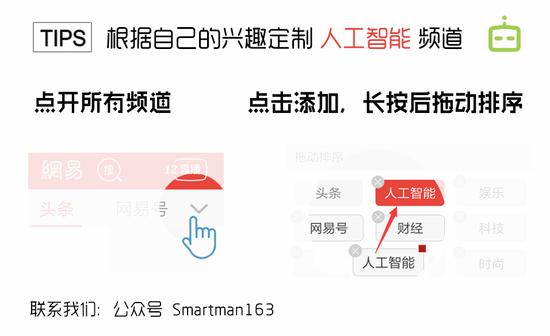 燑br>
燑br>
Manual Lifting Column,Lifting Machine,Lift Mechanism,Linear Lifting Mechanism
Kunshan Zeitech Mechanical & Electrical Technology Co., Ltd , https://www.zheteswitches.com